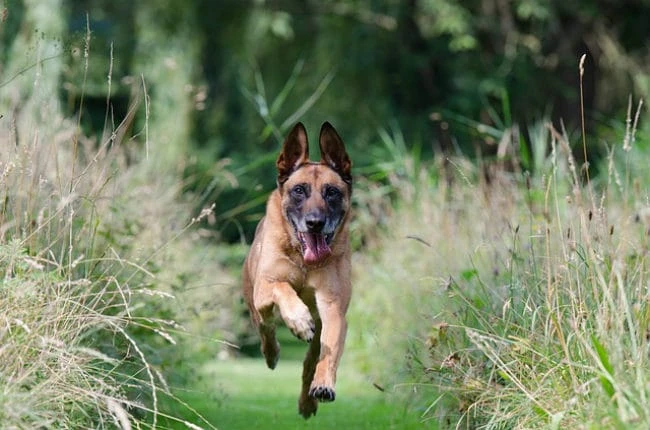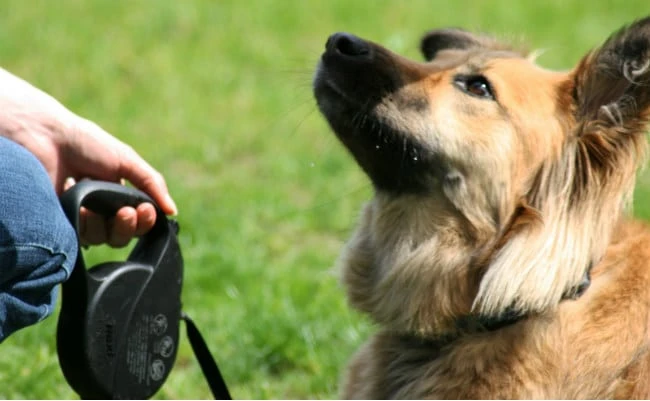Dog Psychology, Dog Psychology Center, Puppy Training Tips

Dog Psychology

In this section we will discuss dog psychology and will provide a selection of free dog & puppy obedience training tips.
For more information on the psychology of dogs and puppies check out our tips section on puppy behavior.
There are certain dog training tools, commands, methods, devices and techniques you can use to cure particular behavior problems.
However, before learning how to train a puppy or dog it is important to be able to understand basic dog psychology and how a dog or puppy learns.
By understanding the psychology of your dog you will be able to understand why your dog does the things he does and the behavior that he exhibits, which will ultimately make training your dog or puppy much easier and also much faster.
Dog Psychology
Understanding Basic Dog & Puppy Behavior and how dogs behave.
A dog is born into this world with a nose, two ears and two eyes – just like a human.
However, unlike humans, dogs learn to use their nose first then their ears and finally they use their eyes – in that order.
Basic Dog Psychology: How Dogs Behave
- Dogs understand everything that you are telling them – but often not by what you are saying but through your body language.
- Dogs communicate with other dogs through their body language and by their scent.
- Dogs have a built in instinct of belonging to a pack.Consequently if you don’t assert your place as the alpha-male and pack leader your dog may try to assert his authority over you by displaying his dominance and thats when dog and puppy behavior problems start.
- Dogs do not want to be treated as humans and don’t believe that they are humans – they are dogs and quite happy that way!
Dog Psychology
Some “Top Tips” About How your Dog Learns.
Understand your Dog
As a dog owner you need to remember that a dog does not instinctively understand the boundaries that exist in human society as opposed to dog society – by this we mean that your dog will do what a dog wants to do and what he thinks is right.
Just because you have bought a new sofa and your dog jumps up on it – doesn’t give you the right to shout at him – he does not understand.
This may sound obvious but think about it – don’t assume that your dog understands what is right and what is wrong.
Be Consistent with your Commands.
Dog behavior problems often start because you the owner and trainer have not been consistent with your dog training commands.
Make sure that the whole family use the same command for each training technique.
By giving your dog mixed signals you are confusing him and this will cause increasing problems in your training and how your dog responds to your training commands.
Dog Socialization
Dogs are naturally very sociable and this goes back to their days within the pack.
Consequently, you need to respond to this need by socializing your dog with new experiences from an early age.
For more information on socialization check out are section on puppy socialization.
Learn How to Train a Dog
By Understanding Dog Psychology
By understanding dog psychology you will learn how to work with your dog and the best way to train your dog.
Below we have listed some top tips and proven
dog training techniques to shift the balance of power so you are responsible for training your dog or puppy how to behave. 
How you Should Behave When Training your Dog.
Below we have listed some top dog training tips, techniques and methods that you can use to get the power balance so you remain top dog and alpha male.
- Always sit in a higher position to your dog. You can expect dog or puppy behavior problems if you allow your dog to sit in your chair and you sit on the floor.
- Don’t let your dog go through the door before you. You are the pack leader and alpha male so you get to go through the door first.
- Don’t let your dog greet any visitors before you. Reward your dog when he behaves well and remains quiet when visitors arrive.
- Don’t let your dog or puppy eat before you or the family.In a pack environment in the wild the alpha male always eats first – so if you want to remain top dog its important that you eat first.
- Does your dog allow you to get near where he sleeps or even let you get into his sleeping area.In the wild the alpha male or pack leader is allowed to sleep anywhere.
- Does your dog allow you to take his food when he is eating? If you are the pack leader you should be allowed to take his food away.
- Does your dog pull on his leash? Check out our section on Dog Leash Training – but it’s important when walking your dog that he is always looking to you for guidance.
- Don’t move out of the way of your dog or puppy if he runs towards you – it is up to your dog to learn to move.
- Remember that you tell your dog when he can sit on you – don’t let your dog assume that he can do this.
- When you stroke your dog do it in a positive and confident manner – if you stroke him feebly you are projecting weakness – you need your dog to look to you for strength and guidance.
- Whenever you are around your dog you should act confident and always be decisive.
- Always be the instigator when it comes to petting or cuddling your dog.
- Don’t give your dog training commands when you are angry, annoyed or frustrated.
- Enforce the ground rules for the first day you bring your dog or puppy home.
- Never ever hit or use physical punishment towards your dog.
Go from dog psychology back to dog training tips or back to dog obedience training home-page




